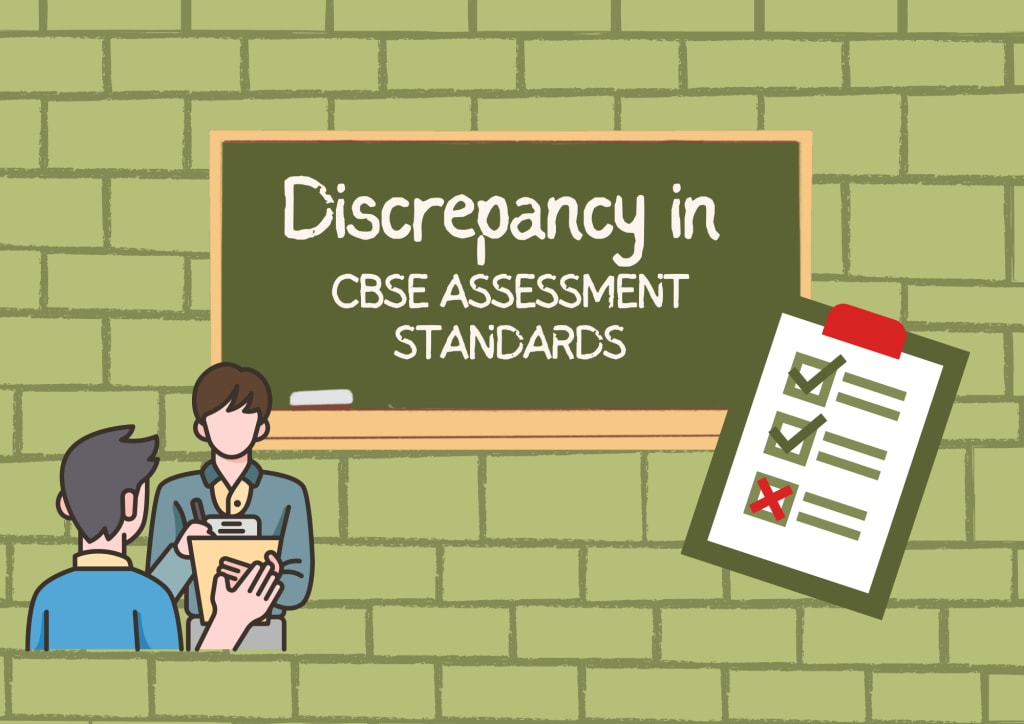Addressing the Discrepancy in CBSE Assessment Standards
AI in CBSE Assessment

The Central Board of Secondary Education (CBSE) has recently brought to light a significant issue in its assessment system. Using AI analysis, the board discovered a substantial gap between students' theory and practical marks, affecting approximately 50% of student results. This discrepancy has raised questions about the reliability and consistency of the CBSE assessment standards. Read more at https://blog.edu123.in/addressing-discrepancy-in-cbse-assessment-standards/
Understanding the Discrepancy
The primary issue lies in the inconsistency between the marks students receive for theory exams and practical assessments. Several factors could contribute to this gap:
Variation in Assessment Standards: Different schools may have varying standards for evaluating theory and practical exams, leading to inconsistent results.
Teaching Methods: The methods employed by teachers in delivering theoretical knowledge versus practical skills could differ significantly, impacting student performance.
Student Engagement: Students might find practical tasks more engaging and easier to perform well in compared to theoretical studies, or vice versa.
Implications for Schools and Students
The implications of this discrepancy in CBSE assessment standards are far-reaching:
Credibility of Results: The reliability of the marks awarded is questioned, which can undermine the overall credibility of the assessment process.
Student Performance Analysis: Inaccurate reflections of student abilities can affect their academic trajectories and future opportunities.
School Accountability: Schools are responsible for ensuring that their assessment methods are fair and consistent, and discrepancies highlight a need for improved oversight.
CBSE’s Response
In response to these findings, the CBSE has issued warnings to schools, urging them to address these gaps and standardize their assessment practices. The board is expected to implement stricter monitoring and evaluation processes to ensure compliance with the established CBSE assessment standards.
What Can Parents and Students Do?
For parents and students navigating these challenges, here are some steps to consider:
Stay Informed: Keeping up-to-date with the latest developments in CBSE assessment standards is crucial. Understanding how these changes might affect students can help in better preparation and adjustment.
Engage with Schools: Open and regular communication with teachers and school administrators is vital. Discussing any concerns about discrepancies in marks can lead to better understanding and solutions.
Focus on Holistic Learning: Encouraging students to excel in both theoretical and practical aspects of their education can help bridge the gap in performance.
The Role of Technology in Addressing the Discrepancy
The use of AI in identifying the gap between theory and practical marks is a testament to the role technology can play in modernizing education. AI can help in:
Data Analysis: By analyzing large sets of data, AI can identify patterns and discrepancies that might not be apparent through manual analysis.
Standardization: AI can aid in creating more standardized assessment methods, ensuring that all students are evaluated on a level playing field.
Feedback Mechanisms: Technology can provide immediate feedback to both teachers and students, helping to address gaps in understanding and performance in real-time.
Future Directions for CBSE
Moving forward, the CBSE is likely to focus on several key areas to improve assessment standards:
Enhanced Training for Teachers: Ensuring that teachers are well-equipped to deliver both theoretical and practical education effectively.
Standardized Assessment Tools: Developing tools and guidelines that help standardize assessment practices across different schools.
Regular Audits: Conducting regular audits and evaluations of school assessment methods to ensure compliance with CBSE assessment standards.
Recommendations for Schools
Schools play a crucial role in ensuring the integrity of the assessment process. Here are some recommendations for schools:
Regular Training Sessions: Organizing training sessions for teachers on effective assessment methods.
Use of Technology: Incorporating technology to aid in the assessment process and ensure consistency in marking.
Student-Centric Approach: Focusing on a student-centric approach that considers both theoretical knowledge and practical skills equally.
Conclusion
The recent findings by the CBSE highlight the need for a more consistent and reliable assessment system. By addressing the discrepancies in theory and practical marks, the board can ensure that students receive a fair evaluation of their abilities. Parents, students, and schools all have a role to play in this process, ensuring that CBSE assessment standards are met and maintained.
As the education landscape continues to evolve, staying informed and adapting to new standards and practices will be crucial in providing students with the best possible education and assessment.
About the Creator
Enjoyed the story? Support the Creator.
Subscribe for free to receive all their stories in your feed. You could also pledge your support or give them a one-off tip, letting them know you appreciate their work.





Comments
There are no comments for this story
Be the first to respond and start the conversation.